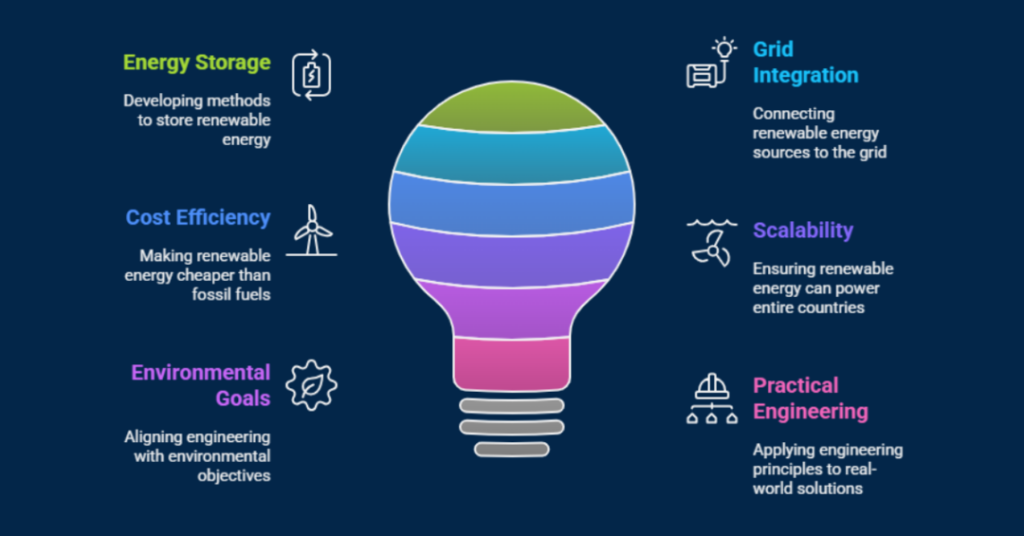20 August 2025
6 minutes read
10 Best University For Renewable Energy Engineering In UK For Indian Students

Key Takeaways
- The best university for renewable energy engineering in UK is not just about rankings but about fit, research focus, and career outcomes.
- In 2024, 47% of Britain’s electricity came from renewable sources, making the UK a prime hub for energy-focused careers.
- Admissions need more than grades with projects, internships, or research in renewable energy technologies carrying heavy weight.
Last year I sat with a student from Delhi who asked me if renewable energy has scope in the UK. I showed him the numbers. In 2024, almost 47 percent of Britain’s electricity came from renewable sources, and on some days wind alone outpaced gas. That isn’t a forecast, that’s the present. And the universities here aren’t sitting on the sidelines. They’re running the research labs, consulting for the government, and training the very engineers who build these systems.
But… and it’s a BIG BUT. Indian students miss the very point. Admissions into MSc renewable energy or environmental engineering programs aren’t decided on grades alone. A 75 percent in your undergrad might tick the box, but it won’t make you stand out. What really moves the needle is evidence, or maybe a solar project you executed on campus, maybe an internship with an energy firm, or… maybe just MAYBE, a research paper on sustainable energy systems. Without that, your application looks like noise.
With it, you enter classrooms where professors are shaping national energy policy, and you graduate into a renewable energy sector projected to create over 200,000 new jobs in the UK by 2030.
What Is Renewable Energy Engineering?
If you google What is Renewable Energy Engineering? you’ll get a generic overview. Mostly something about designing and developing technologies that harness energy from natural sources. Useful, yes, but flat.
If I need to tell you, I would say renewable energy engineering is the science of making clean energy actually work in the real world. It’s not just about solar panels and wind turbines. It goes a little deeper than we think (it took me a while to understand this 😭). It’s about figuring out how to store that energy, how to connect it to the grid, how to make it cheaper than fossil fuels, and how to do it at a scale where entire countries can rely on it. Think of it as the bridge between environmental goals and practical engineering. And right now, the UK is one of the few places where this bridge is being built at full speed.

We can still go deeper into it, where I could tell you what an energy engineering MSc degree will teach you, how you could get the best out of it and all. So, if you want to have a consultation call, I have shared a link at the end of this blog. You can contact us anytime – The consultation is completely free.
10 Best Universities For Renewable Energy Engineering In UK
Now comes the part you’re actually here for. Or maybe Google pushed this blog to the top because you searched “UK universities for MSc in renewable energy systems”. Either way, let’s get straight to it. These are the best places in the UK where you can study renewable energy engineering, programs built around wind, solar, and emerging renewable energy technologies.
And, just as important, what it will cost you and what you can expect to earn after.
| University | Average Tuition Fees (per year) | Average Salary after Graduation |
|---|---|---|
| University of Exeter | £24,000 | £38,000 – £45,000 |
| University of Edinburgh | £28,000 | £40,000 – £48,000 |
| Imperial College London | £33,000 | £45,000 – £55,000 |
| University of Strathclyde | £23,500 | £37,000 – £44,000 |
| University of Manchester | £27,000 | £40,000 – £47,000 |
| Newcastle University | £24,500 | £36,000 – £43,000 |
| University of Southampton | £26,500 | £39,000 – £46,000 |
| Cranfield University | £25,000 | £38,000 – £45,000 |
| Loughborough University | £24,000 | £37,000 – £44,000 |
| University of Glasgow | £25,500 | £39,000 – £47,000 |
What Are The Entry Requirements For MSc In Renewable Energy Engineering In The UK?
Every student I talk to wants a straight answer here, but let me be honest with you, entry requirements for MSc renewable energy engineering in the UK aren’t as simple as “get 60 per cent, do this and that in your GRE exam, and you’re in.” Universities want more than grades. Most of them. They want proof that you can handle a field that mixes hardcore engineering with real-world renewable energy technologies.
Here’s what it usually takes:
| Requirement | What Universities Expect | Insider Insight |
|---|---|---|
| Undergraduate Degree | Mechanical, Electrical, Civil, Environmental Engineering, or Physics. Usually 2:1 UK equivalent (65–70% in India). | If you’re at 60–64%, strong project or work experience can still get you in. |
| Work or Project Experience | Final-year project, internship, or research in renewable energy systems or related technologies. | This often makes or breaks applications. A solar or wind project can outweigh an average GPA. |
| English Language Test | IELTS 6.5 overall (no band below 6.0). Top schools like Imperial/Edinburgh may ask for 7.0. | TOEFL and PTE are also accepted. Don’t wait till the last moment. Scores take weeks to process. |
| Statement of Purpose (SOP) | Clear motivation for studying renewable energy engineering and understanding of renewable energy technologies. | A powerful SOP can turn a borderline profile into an admit. Show passion backed by evidence. |
| References | At least 1–2 academic references, preferably from professors in engineering or energy fields. Here’s a guide on how you can ask a professor for a LOR. | Generic references add no value. Pick someone who knows your work and can vouch for it in detail. |
5 Tips That Can Help You Get Into These Universities
Now that is something I was really excited to share, because it comes from the experience we’ve gained through guiding thousands of students. These aren’t tips you’ll find on generic “study abroad” blogs. They come from real conversations with admission officers, alumni, and professors at some of the best universities for renewable energy engineering in the UK.
Here’s what I tell everyone:
1. Go Beyond Mechanical or Electrical Basics
Having a degree in mechanical engineering or electrical engineering is just step one. What admissions teams want to see is whether you’ve applied it to renewable energy sources. A solar energy project, a dissertation on energy storage, or research into sustainable energy systems immediately shows you belong in an MSc renewable energy engineering program. At the University of Exeter and University of Manchester, I’ve seen students with average marks but strong renewable projects beat higher scorers with no exposure.
2. Connect Engineering With Energy Policy
Most SOPs sound like they were written by ChatGPT. What stands out is when you show you understand both sides of the equation, the engineering design and the bigger picture of energy policy, energy supply, and global energy efficiency. A student I guided with a chemical engineering background tied his technical skills to sustainable energy solutions and got into Durham University with a partial scholarship. That’s the difference clarity makes.
3. Don’t Blindly Follow Rankings
Students often fixate on “best universities” like Imperial or Edinburgh, but the growing renewable energy sector in the UK needs talent across the board. Coventry University has strong links to industry, Plymouth leads in tidal energy, and East London has a sharp focus on energy conversion and sustainability. These programs are accredited by the Energy Institute and offer the same career in renewable energy opportunities as higher-ranked schools. If you’re serious about studying renewable energy, ignore prestige games and focus on fit.
4. Value Of Small Projects
You don’t need a fancy internship at Shell to impress. Even small but real experiences matter. A wind energy prototype, a community project on renewable heat, or research into aspects of renewable energy storage systems. Cranfield University, for instance, has admitted students with modest but specific experience over applicants with higher grades but no practical proof. In this field, initiative counts more than numbers.
5. Show You’ve Done Your Homework
Admission officers can tell when you’ve actually studied their work. If you mention Newcastle University’s projects on energy storage, Southampton’s research in sustainable energy technologies, or Cranfield’s expertise in energy management, it shows intent. One of my students even referenced University of Plymouth’s research in offshore renewable and sustainable energy, and the professor reviewing the SOP mentioned it in the interview. That single line set him apart.
Conclusion
What I’ve seen, year after year, is that the students who do well here aren’t always the ones with the highest grades. They’re the ones who can show evidence: a project, an internship, or even a small but well-executed idea that proves they can think beyond textbooks. If you can bring that to the table, the universities will take you seriously, and the industry will too.
So before you hit “apply,” ask yourself a harder question: not “Which university should I choose?” but “What do I bring to this field that the university will want?” Get that right, and the rest, admission, jobs, even long-term career growth, follow naturally.
I know you probably still have questions: Which university fits your profile? Is your SOP strong enough? Do your projects really stand out? That’s exactly where Ambitio comes in. We’ve helped thousands of students crack admits into the UK’s top renewable energy programs, and we can do the same for you. Book a 1-hour consultation call with experts. Completely free.
FAQs
What are the entry requirements for these MSc programs?
Entry requirements vary by university and program. Visit the university websites for specific information on academic qualifications and English language proficiency requirements.
Are there scholarships available for international students?
Yes, many universities in the UK offer scholarships to international students. These scholarships can significantly reduce the financial burden of pursuing a master’s degree. Explore scholarship options on the university websites.
How long do these MSc programs typically last?
MSc programs in renewable energy engineering typically last one year full-time. Some universities may offer part-time options that extend the duration of the program.
What are the career prospects after completing these programs?
Graduates of these programs can pursue careers in renewable energy project management, energy consulting, research and development, and more. The renewable energy sector offers diverse career opportunities.
How can I apply for these programs?
To apply for these MSc programs, visit the respective university websites for application instructions and deadlines. Each university may have a different application process, so be sure to follow their guidelines carefully.
Are there any additional resources for international students studying renewable energy engineering in the UK?
Many universities offer support services for international students, including academic and career guidance. Additionally, consider reaching out to organizations like SI-UK (Study in the UK) for free consultations and advice on studying in the UK.

You can study at top universities worldwide!
Get expert tips and tricks to get into top universities with a free expert session.
Book Your Free 30-Minute Session Now! Book a call now




























